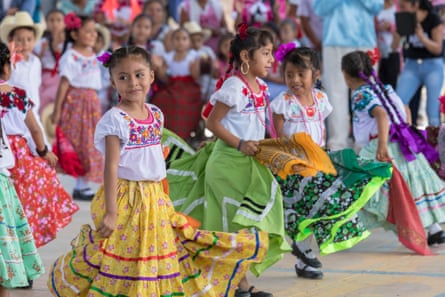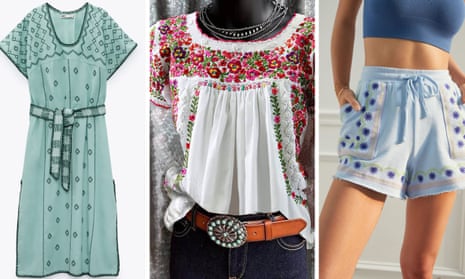Mexico has accused the international fashion brands Zara, Anthropologie and Patowl of cultural appropriation, claiming they used patterns from indigenous groups in their designs without any benefit to the communities.
The culture ministry said in a statement that it had sent letters signed by the culture minister, Alejandra Frausto, to the three companies, asking each for a “public explanation on what basis it could privatise collective property”.
The ministry said the companies had taken inspiration from designs created in the south-western state of Oaxaca and called for benefits to be awarded to the communities behind them.
Zara, which is owned by the world’s largest clothing retailer, Inditex, is accused of using a pattern distinctive to the indigenous Mixteca community of San Juan Colorado in the creation of a mint-coloured midi dress with green embroidery.
The culture ministry claimed the design “reflects ancestral symbols related to the environment, history and worldview of the community” and was similar to traditional huipil dresses which, it said, were part of the women’s identity and took local craftspeople at least a month to make.
Inditex said in a statement sent to Reuters: “The design in question was in no way intentionally borrowed from or influenced by the artistry of the Mixtec people of Mexico.”
The ministry also alleged that Anthropologie, owned by URBN, had copied an embroidery design developed by the Mixe community of Santa Maria Tlahuitoltepec in the production of its sky blue, raw-hemmed shorts, decorated with violet and mint embroidery. The patterns allegedly copied in this embroidery “are a manifestation of identity, history and relationship with the environment”, it said.
It claimed too that Patowl had copied a pattern from the Zapotec community in San Antonino Castillo Velasco for its floral blouses, which are trimmed with lace and delicate embroidery. The government alleged the handmade floral embroidery copied the community’s intricate hazme si puedes “make me if you can” technique.
URBN and Patowl did not respond immediately to Reuters’ requests for comment.

The extent to which fashion designers have profited from incorporating cultural designs without acknowledging their origins or fairly compensating communities has been a point of contention in recent years.
The issue is particularly high-profile in Mexico, where hundreds of years of western brands copying indigenous designs, often produced by poverty-stricken communities, and reselling them as “boho chic” for hundreds or even thousands of pounds has recently been amplified by public accusations and opprobrium on social media.
Frausto issued a statement last autumn saying that Mexico would no longer tolerate the cultural appropriation of local designs without due credit, according to fashion trade title WWD.
This action, which the ministry said was taken to shine a light on issues including “protecting the rights of native peoples who have historically been invisible”, is the latest example.
In February, the Oaxaca Artisans Institute in southern Mexico charged the Australian clothing brand Zimmermann, worn by high-profile fans including Kendall Jenner and the Duchess of Cambridge, with plagiarising the Mazatec community for its resort 2021 collection.
Zimmermann claimed the error had been unintentional but withdrew the item from sale. “We apologise for the usage without appropriate credit to the cultural owners of this form of dress and for the offence this has caused,” it said in an Instagram post.
The intellectual property lawyer Joaquín Elizalde told WWD at the time that companies would be unlikely to stop appropriating Mexican design without an overhaul of intellectual property legislation. “Procedures are long and costly and many of these communities just can’t pay them,” he said.
The French designer Isabel Marant offered her “most sincere apologies” in November after Mexico’s culture ministry accused her of copying a pattern created by the Purepecha community.
Marant was famously accused of copying another Mexican design in 2015, and admitted she was “inspired by” the indigenous Mixe community. That became part of her defence when she was sued by another French label, Antik Batik, which accused her of copying their design in the blouse’s creation.
The court ruled in Marant’s favour, saying that Antik Batik could not claim property rights to the design because the designs were inspired by the traditional patterns of the Mixe community, which staged protests outside Marant’s New York shop.
Oaxaca’s congress gave the Mixe design – a 600-year-old traditional Tlahuitoltepec blouse – protected status as unique to Mixe culture in 2016, but the status is not legally binding.
Reuters contributed to this report










